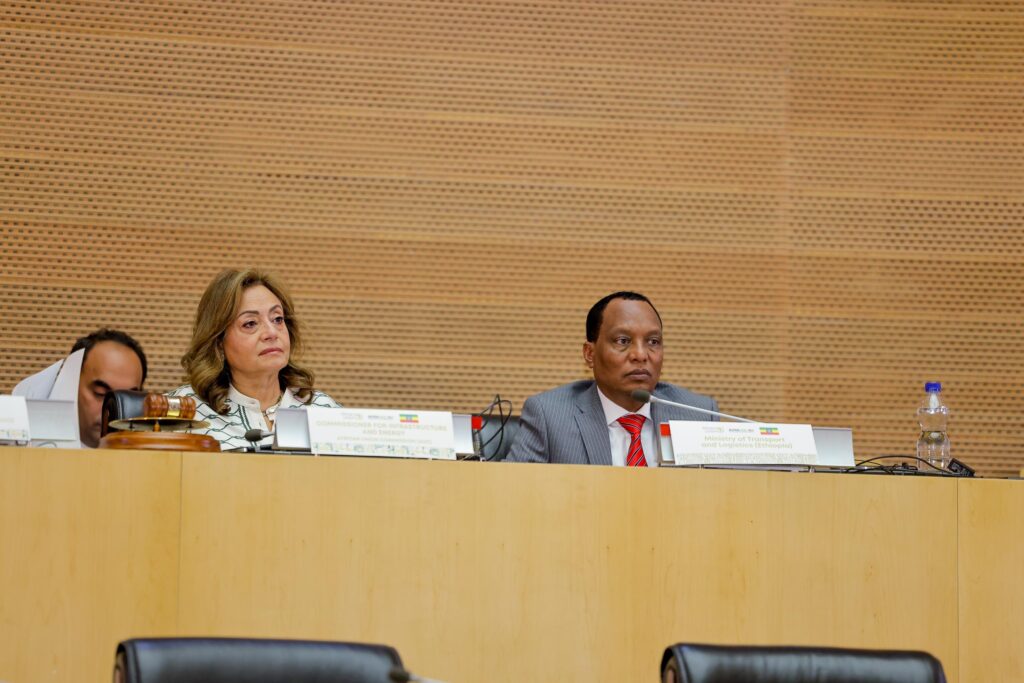8th PIDA Week Kicks Off with Renewed Commitment to Africa’s Infrastructure Development


Commissioner for Infrastructure and Energy with Ethiopia President Taye Atske Selassie Amde paying attention at the official opening of 8th PIDA week at the African Union Headquarters
By Baboloki Semele
Addis Ababa, Ethiopia, 26 November 2024 – The 8th Programme for Infrastructure Development in Africa (PIDA) Week commenced with a resounding call to action from Commissioner of Infrastructure and Energy, Amani Aboud-Zeid of the African Union Commission (AUC). Held under the theme “Fostering Resilient and Inclusive Infrastructure for Africa’s Sustainable Growth: Leveraging Transformative Financing and Regional Integration,” the event marks a pivotal moment for assessing progress and strategizing for Africa’s infrastructure future.
Hosted at the African Union Headquarters, this year’s PIDA Week highlights the transformative potential of cross-border infrastructure projects under the continent-wide initiative spanning until 2040. Commissioner Aboud-Zeid emphasized the milestone of a decade of PIDA implementation, celebrating achievements such as the development of 16,000 kilometers of roads, 4,000 kilometers of railway lines, and the electrification of nearly 30 million people.
“PIDA has laid the groundwork for increased trade, investment, and economic cooperation across Africa. It is integral to realizing the goals of Agenda 2063,” remarked the Commissioner.
Challenges in Financing
While PIDA has made strides, Commissioner Aboud-Zeid highlighted the urgent need to address financing gaps. Only 3% of funding has come from the private sector, significantly lagging behind global regions where private investment accounts for 16-19%. She called for a unified approach to secure public and private investments, urging African governments to make infrastructure financing a political priority.
“We must mobilize public resources and create environments conducive to private sector engagement. Committing national budgets and offering credit guarantees are essential steps forward,” she said.
Climate Resilience and Digital Integration
Recognizing the growing pressures of urbanization, economic growth, and climate change, the Commissioner underscored the importance of integrating climate resilience and digitalization into infrastructure planning. She announced the development of a new Continental Policy on smart and climate-resilient infrastructure, which aligns with Agenda 2063.
“This policy underscores our dedication to ensuring today’s investments yield lasting benefits for future generations,” she noted, referencing tools like the PIDA Quality Label and Green Check Methodology that embed climate adaptation into project assessment.
Strengthening Partnerships
Commissioner Aboud-Zeid called for enhanced collaboration among PIDA stakeholders, Regional Economic Communities (RECs), and Member States to accelerate implementation. She emphasized the need for collective bargaining power in negotiations with external financiers and private investors.
“Stronger partnerships and enabling Public-Private Partnerships will help mobilize additional resources and expertise to sustain Africa’s infrastructure growth,” she added.
Looking Ahead
As delegates and stakeholders convene for this week-long event, the Commissioner’s closing message was clear: “Let us recommit to making PIDA a driving force for resilient, inclusive, and sustainable infrastructure across Africa.”
The outcomes of this PIDA Week will serve as a foundation for the mid-term review of PIDA in 2025, setting the stage for Africa’s ambitious infrastructure agenda.







